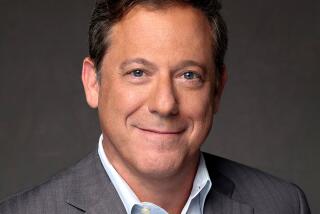‘Hunger Games’ director Gary Ross bows out of sequel
In just a few months, actress Jennifer Lawrence will return to the arena to fight for her life again as Katniss Everdeen in “Catching Fire,” the sequel to “The Hunger Games.” But her director and off-screen mentor, Gary Ross, will not be joining the fight.
Ross and Lionsgate, the studio behind the hit movie, surprised millions of fans and many in Hollywood — even some who work at the Santa Monica company — with the news that the director was giving up the franchise’s reins.
“As a writer and director, I simply don’t have the time I need to write and prep the movie I would have wanted to make because of the fixed and tight production schedule,” Ross said in a statement released by the studio.
“The Hunger Games” was released at the end of March and has grossed $310 million domestically and an additional $157 million overseas. Ross and Lionsgate had been negotiating for weeks over the director’s deal to make “Catching Fire,” which is scheduled to be released Nov. 22, 2013.
Although his deal was unfinished, all indications were that he was to continue working on adaptations of the bestselling books. He quipped at the film’s premiere that he would be immediately moving onto preparations for the sequel and spoke openly about his plans for the series during production on “The Hunger Games,” according to a person present but not authorized to speak publicly. In addition, Ross, who co-wrote the “Hunger Games” screenplay, had already met with the “Hunger Games” books author Suzanne Collins and the sequel’s screenwriter, Academy-Award winning Simon Beaufoy (“Slumdog Millionaire”), about the adaptation.
While money was a factor in talks, it doesn’t appear to have been the sole reason for Ross’ departure. The director, who was paid $3 million upfront for “The Hunger Games” and could make upward of $15 million from his share of the profits, would undoubtedly have been paid as much or more for the sequel. Ross’ representative declined to comment on the financial details of his deal.
Another factor appears to have been scheduling. Last week, rival studio 20th Century Fox decided that it would begin production of its sequel to “X-Men: First Class” in January. “The Hunger Games” star Lawrence, who played the role of the blue-skinned Mystique in the original, is contractually obligated to make that film her scheduling priority.
Fox’s move came as a surprise because the “First Class” sequel does not yet have a release date or completed script, according to people familiar with the project. A person with knowledge of the situation said that although the studio needed time to assemble the ensemble cast, it was being flexible in order to accommodate Lionsgate’s needs.
Regardless, the “X-Men” move forced Lionsgate to move up the planned start of production for “Catching Fire” from the fall to August.
That left Ross with only four months to ready the film, half the time he had on the first movie. Ross, a three-time Academy Award nominee for screenwriting, wanted to do a rewrite on Beaufoy’s script, as he did on the original “Hunger Games” script by Billy Ray. The second book features a lot more action and will probably require a more elaborate shot list. There has also been speculation that the movie will shoot on location in North Carolina, where the original took place, and possibly Hawaii, to double as the jungle setting in the book.
Ross, who didn’t make a film for eight years between “Seabiscuit” in 2004 and “The Hunger Games,” was unwilling to accelerate his process to meet Lionsgate’s scheduling demands.
The talks with Ross were complicated by the fact that many of the key Lionsgate executives he dealt with on “The Hunger Games” are no longer in charge, having left the company when it merged in January with “Twilight” studio Summit Entertainment. Former Motion Picture Group President Joe Drake and Production President Alli Shearmur, who worked closely with Ross and were personally thanked by him at the premiere, have been replaced by Summit executives. Summit. Former Summit Co-Chairman Rob Friedman, who along with partner Patrick Wachsberger now occupies Drake’s old position, played a lead role in talks with Ross, alongside studio’s Chief Executive Jon Feltheimer and Vice Chairman Michael Burns.
“The Hunger Games” is not the first franchise to deal with director churn, however. The “Harry Potter” series featured four directors over eight films, while the four “Twilight” films have had four helmers (all picked by Friedman). Both franchises grossed billions of dollars despite the switches behind the cameras. As a result, most in Hollywood expect Lionsgate will not offer a huge paycheck to lure an A-list director to “Catching Fire.”
Now the studio will scramble to land a new director in the next few weeks in order to film its sequel — the second in a planned series of four “Hunger Games” movies — this year. Although Ross has already laid much of the groundwork by establishing a tone for “The Hunger Games” series and helping to cast the lead actors, the new director will face a daunting task. He or she will have just a few months to prepare for what will probably be a $100-million-plus production, working with an unfinished script. Perhaps most significantly, the director will face intense pressure from Lionsgate, which has seen its financial fortunes transformed by the success of the recent movie.
Some on Wall Street expressed concern Wednesday that the director scramble could cause a delay in the movie’s planned release date.
However, Lionsgate did unexpectedly move its release date for “Ender’s Game,” another upcoming movie based on a futuristic novel that features a teenage protagonist, for Nov. 1, 2013 — just weeks before the planned “Catching Fire” release date. That could soften the blow if “Catching Fire” is delayed to 2014.
But the biggest danger might be if the uncertainty affects the film itself, after “The Hunger Games” received surprisingly strong reviews for a young adult novel adaptation and phenomenal word of mouth.
“Investors are concerned about the value of the franchise, so even if the second movie gets pushed back a few months, it shouldn’t seriously impair the financials, so long as the new director can deliver,” said Monica DiCenso, an analyst at JPMorgan Chase & Co. who follows Lions Gate Entertainment Corp., the studio’s parent.
Stockholders weren’t immediately panicked, however. Shares in Lions Gate rose 16 cents, or nearly 1.3%, to $12.78 on Wednesday.
More to Read
The biggest entertainment stories
Get our big stories about Hollywood, film, television, music, arts, culture and more right in your inbox as soon as they publish.
You may occasionally receive promotional content from the Los Angeles Times.










